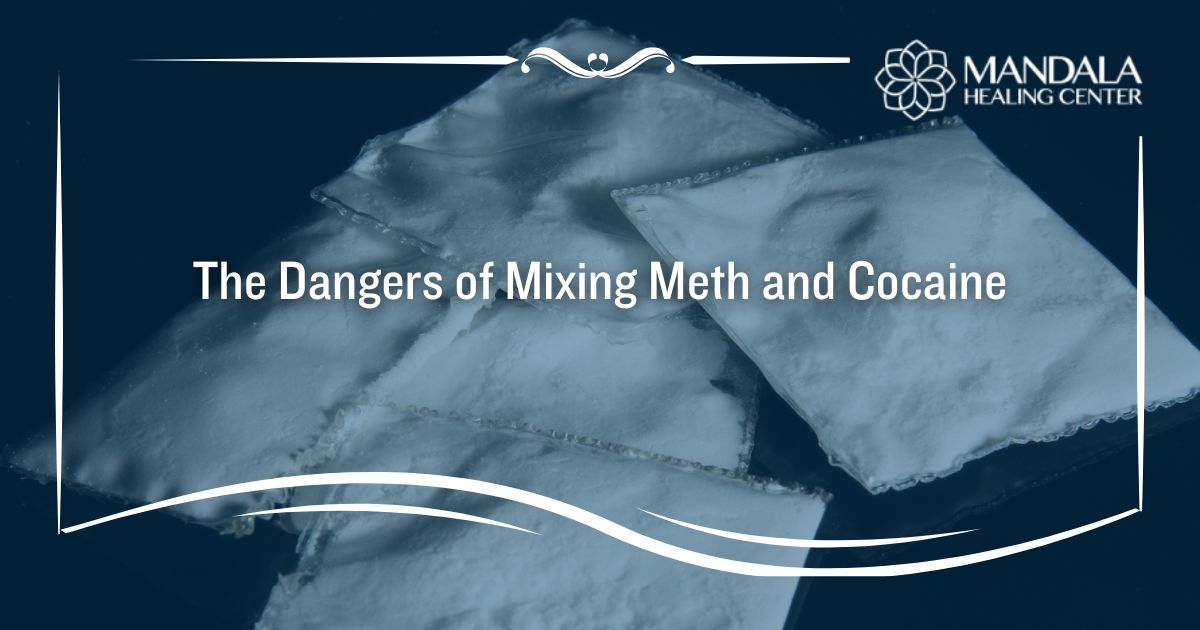Meth and cocaine are two common, illicit drugs known for their intense, pleasurable effects. While they’re often used independently, sometimes people mix the two drugs in an attempt to experience an even more powerful high. However, doing so is dangerous, as it places extreme stress on the body and can lead to toxic, life-threatening effects like heart attack, brain damage, and overdose.
To prevent these serious health issues, it’s crucial to understand the risks of mixing meth and cocaine. Both drugs are addicting, and whether taken together or separately, they can even be deadly.
In this article, we’ll break down:
- Why mixing meth and cocaine is so dangerous
- The short and long-term effects of mixing stimulants
- The mental and emotional impact of mixing the two drugs
- The signs of drug addiction
- Where to find support for drug addiction
If you or someone you care for is struggling with an addiction to drugs, you’re not alone. Evidence-based treatment programs, like those offered at Mandala Healing Center, provide the guidance and support needed to recover. Contact the team today to schedule an intake appointment, get your questions answered, or learn more about what programs your insurance will cover.
The Effects of Meth and Cocaine
Meth, short for methamphetamine, is an addictive central nervous system stimulant that increases the amount of dopamine in the brain. This leads to feel-good effects like euphoria and increased energy levels. Cocaine is another stimulant that, unlike meth, produces a shorter but equally intense high by also flooding the brain with dopamine. Increases in feelings like joy, confidence, and energy are common when a person uses cocaine.
Meth is hard on the heart and central nervous system, causing symptoms like:
- Increased heart rate
- High blood pressure
- Aggression
- Rapid breathing
- Memory loss
Cocaine, on the other hand, typically leads to effects like:
- Alertness
- Increased energy
- Anxiety
- Panic attacks
- Paranoia
- Irritability
- Talkativeness
- Sensitivity to light, tough, and sounds
When these illicit drugs are combined, instead of canceling each other out, they make the effects stronger. Since the two are already dangerous on their own, they carry even more significant risks when mixed.
The Dangers of Mixing Meth and Cocaine
Combining cocaine and meth creates a stronger, longer-lasting high, but this perceived benefit comes with lots of risk. As the two drugs strain the central nervous system, they put immense pressure on organs like the heart and brain. Some of the potential complications of mixing meth and cocaine are as follows.
Poor Mental Health
Both meth and cocaine affect the chemical makeup of the brain, affecting mood, judgment capabilities, and emotional regulation. Over time, these changes can lead to the onset of serious mental health conditions, such as:
- Depression: While people who use cocaine and meth together experience an initial high, once it wears off, they can quickly slip into a depression as reality sets back in.
- Aggression: Mixing meth and cocaine can make people more impulsive, leading them to do things they wouldn’t normally do. Irritability and potentially violent behavior can result.
- Anxiety and panic attacks: Chronically overstimulating the central nervous system with meth and cocaine can cause anxiety and panic attacks.
- Psychosis: A potential long-term effect of mixing cocaine and meth is experiencing psychosis, which can come with hallucinations, delusions, or extreme paranoia.
Long-Term Heart Damage
Meth and cocaine cause the heart to work a lot harder than usual, which can lead to permanent heart damage, increasing the risk of:
- Heart attacks: Combining meth and cocaine causes the blood vessels in the heart to constrict, making it easier for blood clots to form and stop the flow of blood to the heart. This can make a person more susceptible to a heart attack.
- Arrhythmias: Irregular heartbeats, or arrhythmias, can be deadly if the heart suddenly stops pumping out blood.
- High blood pressure: Using stimulants chronically can cause high blood pressure, which increases the risk of stroke or heart failure.
- Heart failure: If the heart is under too much stress for an extended time, it can weaken and eventually fail, which can be fatal.
The heart isn’t the only organ that can be affected. The lungs, brain, kidneys, and liver are also at risk when meth and cocaine are combined. Respiratory diseases, lung infections, and kidney failure are just a few of the potential tolls the drugs can take on the body in the long run.
Increased Risk of Overdose
As stimulants, meth and cocaine significantly raise heart rate, body temperature, and blood pressure. This means that when they’re mixed together, the chances of overdose go up even more. Some signs of a stimulant overdose include:
- Rapid breathing
- Nausea or vomiting
- Confusion or disorientation
- Hot, flushed skin
- Excessive sweating
- Tremors
- Difficulty breathing
- Panic
Since stimulants are known for hiding fatigue and common warning signs indicating distress, some people might continue taking the drugs without realizing that they’re nearing an overdose. In these situations, finding immediate medical attention is critical.
Seeking Help for Substance Use Disorders
Are you or a loved one struggling with meth or cocaine, or perhaps both? If so, Mandala Healing Center can help. We offer a variety of resources, including medical detox, therapy, and medication-assisted treatment (MAT) to support you or your loved one in your healing journey. Our staff understands the complexities of substance use disorders and can work with you to develop a plan that meets your needs. Contact our team today to learn more.
Resources:
















